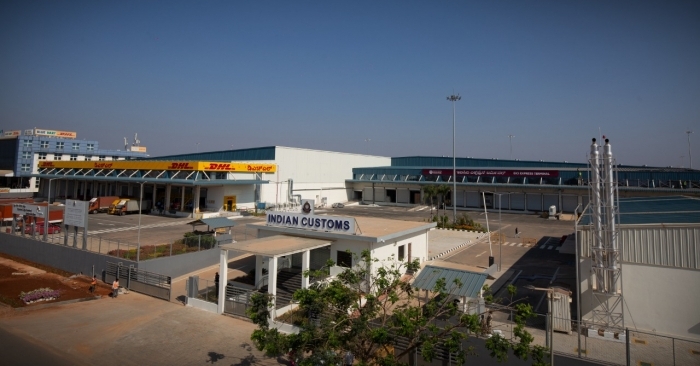BLR Airport unveils India’s first dedicated express cargo terminal
March 12, 2021: Bangalore International Airport (BIAL), operator of Kempegowda International Airport, Bengaluru (KIAB/ BLR Airport) today (March 12) unveiled India’s first dedicated Express Cargo Terminal at its premises.

March 12, 2021: Bangalore International Airport (BIAL), operator of Kempegowda International Airport, Bengaluru (KIAB/ BLR Airport) today (March 12) unveiled India’s first dedicated express cargo terminal at its premises.
The 200,000 sq ft dedicated facility will house global courier players such as DHL Express, UPS, FedEx and Express Industry Council of India (EICI). What makes the terminal different are the facts that it was entirely designed (including the floor plan) by the courier players themselves (built-to-suit) and has separate customs clearance thus decreasing the business cost and transit time. With an annual capacity to handle 150,000 metric tonnes (MT), the facility will take the Airport’s overall annual cargo capacity to 720,000 MT, from the existing 570,000 MT.
Hari Marar, managing director & CEO, BIAL, said, “BIAL is committed to helping all stakeholders in the supply chain. We have seen a tremendous increase in the demand for domestic as well as cross border e-commerce shipments. Over the years the percentage of international courier in the total cargo handled has grown from 4 to 7 percent. BLR Airport is well-positioned to become the cargo gateway for South India. Dedicated express cargo terminal is a big step in that direction.
M Srinivas, chief commissioner of customs, Bengaluru zone, said, "Due to penetration of internet even to the villages and the extensive use of mobile phones people could make the online orders right from anywhere and has resulted in the increase of e-commerce business. BIAL has taken the initiative in the right direction as the courier segment is already growing and the pandemic only accelerated it. We are committed to decreasing dwell time and ease the customs procedures. We will also soon have a separate commissionerate for the air cargo."
The facility came from the understanding that the growing online shopping or e-commerce market is expected to contribute to the growth of the international express/courier market as well. According to Indian Brand Equity Foundation, the Indian e-commerce market is expected to grow to $200 billion by 2026 from $38.5 billion as of 2017. This trend has been accelerated by the Covid-19 pandemic as well. As per the report produced by Unicommerce, in the fourth quarter of 2020 India’s e-commerce order volume grew by 36 percent and gross merchandise value increased by 30 percent YoY.
Meanwhile, BIAL expects e-retail shares of both Indian domestic air cargo and the airport to rise up to 50 percent. Bengaluru is also situated at the logistics centre to many mushrooming manufacturing centres in Tier 2 and Tier 3 cities like Belagavi, Hubballi, Hosur, Mangaluru, Mysuru, Coimbatore and Salem.
.jpeg.jpg)
With an annual capacity to handle 150,000 metric tonnes (MT), the facility will take the Airport’s overall annual cargo capacity to 720,000 MT, from the existing 570,000 MT.
With an overall annual cargo capacity of 5,70,000 metric tonnes, BIAL has already expressed its intension to increase its capacity to a million metric tonnes in few years. In October 2020, the airport recorded a 26-month high cargo tonnage of 34,339 metric tonnes and the highest-ever domestic outbound tonnage of 8,117 MT, largely driven by e-commerce shipments. In September 2020 it was the first Indian metro airport to report positive growth in YoY cargo volumes after the prolonged slump due to Covid-19 pandemic.
The express cargo market for business-to-consumer (B2C) and business-to-business (B2B) is expected to increase tremendously during the next decade. This is attributable to an increased number of service providers, improved transit time, and value-added services.
The airport plans to use this dedicated infrastructure to facilitate ease of doing business and reduce transaction time cost for the shipper/consignee by providing a dedicated handling facility for express courier shipments, thereby offering additional benefits to customers in Bengaluru Metropolitan Region. With the new Express Cargo Terminal, BLR Airport is aspiring to become an e-commerce hub as well.
During the E-Commerce Logistics Summit organised by Indian Transport & Logistics News in Bengaluru in 2019, Satyaki Raghunath, chief strategy & development officer, BIAL had said, “We believe that 50 percent of our cargo, especially the import and domestic, are going to be from the electronic, e-commerce and e-retail space. The express cargo terminal is a significant step in terms of facilitating trade commerce and the movement of goods across the aviation and wider ecosystem.”
In the same event, responding to a question asked by Vasudevan Rajagopalan, head of customs compliance, DHL Express India, on whether the Express Cargo Terminal will be of world-class in terms of the speed and the regulatory approvals it goes through, Raghunath said, “The idea of putting together the express terminal is to make sure that all facilities are under a single roof. The intent is to give customers a world-class experience from physical infrastructure, virtual infrastructure, access from landside and airside perspective. Our mission is to make your business as easy as possible.”

Libin Chacko Kurian
Assistant Editor at STAT Media Group, he has six years of experience in business journalism covering food & beverage, nutraceuticals and now logistics. His current passion is to understand the nuances of global supply chains and their current turmoil. Outside work, he is also interested in philosophy, history, birding and travelling. Mail him: libin@statmediagroup.com Follow on LinkedIn


